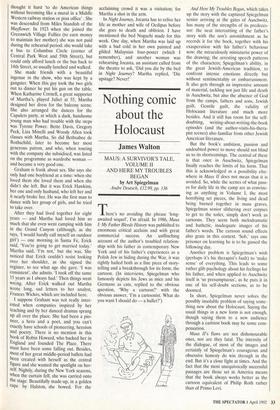Nothing comic about the Holocaust
James Walton
MAUS: A SURVIVOR'S TALE, VOLUME II AND HERE MY TROUBLES BEGAN by Art Spiegelman Andre Deutsch, £12.99, pp. 136 here's no avoiding the phrase 'long- awaited sequel', I'm afraid. In 1986, Maus I: My Father Bleeds History was published to enormous critical acclaim and with great commercial success. An unflinching account of the author's troubled relation- ship with his father in contemporary New York and of his father's experiences as a Polish Jew in hiding during the War, it was rightly hailed both as a fine piece of story- telling and a breakthrough for its form, the cartoon. (In interviews, Spiegelman who famously depicts his Jews as mice and his Germans as cats, replied to the obvious question, 'Why a cartoon?' with the obvious answer, 'I'm a cartoonist. What do you want I should do — a ballet?') And Here My Troubles Began, which takes up the story with the captured Spiegelman senior arriving at the gates of Auschwitz, has many of the strengths of its predeces- sor: the neat intercutting of the father's story with the son's astonishment as he records it for the book, together with his exasperation with his father's behaviour now; the miraculously miniaturist power of the drawing; the arresting speech patterns of the characters; Spiegelman's ability, in the great Jewish-American tradition, to confront intense emotions directly but without sentimentality or embarrassment. It also gets through an impressive amount of material, tackling not just life and death in Auschwitz, but also the absence of God from the camps, fathers and sons, Jewish guilt, Gentile guilt, the validity of Holocaust literature and much more besides. And it still has room for the self- doubting, writing-about-writing-the-book episodes (and the author-visits-his-thera- pist scenes) also familiar from other Jewish American literature.
But the book's ambition, passion and undoubted power to move should not blind us to its shortcomings. The central of these is that once in Auschwitz, Spiegelman finally reaches the limits of his form. That this is acknowledged as a possibility else- where in Maus II does not mean that it is avoided. So, while the scenes of what pass- es for daily life in the camp are as convinc- ing as anything in Volume I, the most horrifying set pieces, the living and dead being burned together in mass graves, Spiegelman senior slithering over corpses to get to the toilet, simply don't work as cartoons. They seem both melodramatic and bathetic, inadequate images of his father's words. The cartoon sound effects also grate in this context. 'Sob,' says one prisoner on learning he is to be gassed the following day.
Another problem is Spiegelman's wish (perhaps it's his therapist's fault) to 'make sense' of everything. This leads to some rather glib psychology about his feelings for his father, and when applied to Auschwitz itself is `so presumptuous', as he puts it in one of his self-doubt sections, as to be doomed.
In short, Spiegelman never solves the possibly insoluble problem of saying some- thing new about the Holocaust. Saying the usual things in a new form is not enough, though saying them to a new audience through a cartoon book may be some com- pensation.
Maus H's flaws are not dishonourable ones, nor are they fatal. The intensity of
the dialogue, of most of the images and certainly of Spiegelman's courageous and obsessive honesty do win through in the end. But it's a close fight at times. And the fact that the most unequivocally successful passages are those set in America means that the book always works better as the cartoon equivalent of Philip Roth rather than of Primo Levi.


























































 Previous page
Previous page